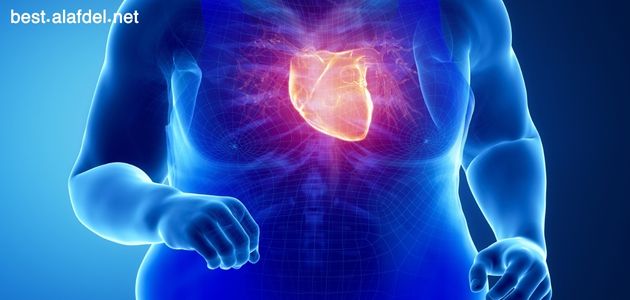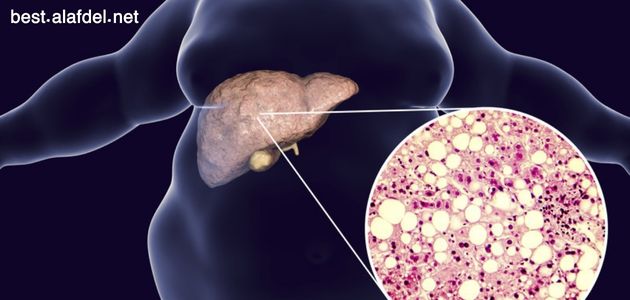obesity damage; Is this problem really may lead to death
Obesity side effects
obesity damage; Learn about the most important and dangerous risks to a person from the problem of obesity, and how it brings a person closer to death?

obesity damage; There is no doubt that increasing body weight is harmful and causes many different problems and diseases, and the matter becomes more dangerous when weight gain turns into obesity. Here we will learn about the damages of obesity by stating the 18 most important and dangerous harms to human health, and Is this problem really may lead to death?
The causes of obesity in a nutshell
Before starting to explain the damages of obesity, we briefly shed light on the causes of this serious problem. Overweight and obesity are defined as abnormal or excessive fat accumulation that is dangerous to health. A body mass index (BMI) over 25 is considered overweight, while a BMI over 30 is considered obese.
Obesity is a complex condition with many causes and consequences, and the most common cause of obesity is an imbalance between energy intake and energy expended by a person. When we eat more calories than we burn, our bodies store the excess as body fat. This energy imbalance can be caused by a variety of factors, including:
- Unhealthy diet: Eating large amounts of calories, especially from unhealthy foods such as fast food, processed foods, and sugary drinks.
- Lack of physical activity: a sedentary lifestyle with little or no exercise.
- Genes: Obesity can run in families, suggesting that genes may play a role.
- Medical conditions: Some medical conditions can lead to weight gains, such as hypothyroidism and Cushing’s syndrome.
- Medications: Taking certain medications may also lead to obesity.
- The Impact of Technology: where many people spend time on the Internet and TV without making any effort, and at the same time they eat a lot of food during that.
Among the causes of obesity as well as psychological reasons. People can become addicted to food in the same way they become addicted to drugs or alcohol.
The good news is that obesity is preventable and treatable. Making healthy lifestyle choices, such as eating a nutritious diet and getting regular exercise, can help people avoid becoming obese, and for those who are already obese, weight loss surgery and other treatments can help them lose weight and improve their health.
Diabetes is a risk for obesity
Obesity is one of the causes that may lead to type 2 diabetes, as many studies and research have shown that a person with obesity or obesity is more likely to develop type 2 diabetes, and it is known that the risk of death can increase in patients with diabetes. diabetes.
One of the diabetes prevention methods is to get rid of obesity and excess weight. At the same time, Diabetic care also requires weight loss. When a person develops diabetes for any reason, he is at risk of developing one of the following health problems:
- heart disease.
- Amputation of a limb.
- Renal diseases.
- Infections that are difficult to heal.
- brain attack.
- blindness.
- ED.
- Hypertension.
- Circulatory and nerve defects.
Effects of obesity on the heart

The effects of obesity on the heart are both physical and psychological, as the incidence of heart disease and strokes is one of the potential disadvantages of obesity, as obesity makes a person more susceptible to developing high blood pressure, and it also causes a change in the body’s natural cholesterol levels by:
- High harmful cholesterol.
- Low good cholesterol.
- High levels of triglycerides.
The above factors are risk factors that eventually lead to heart disease and strokes. In addition, obese people are more likely to suffer from depression and anxiety, which can also lead to heart problems. How to be healthy and avoid the damage of obesity? By maintaining a healthy weight and getting rid of excess weight and obesity. 1
“Read Also website ideas“
Effects of obesity on women
The effects of obesity on women are represented in the emergence of complications in women’s health, as follows:
- Excess weight can hinder pregnancy in women.
- It may also increase a woman’s chance of serious complications during pregnancy.
- Irregular menstruation in girls.
Women who are obese are at increased risk of many serious health problems, including heart disease, stroke, diabetes, and certain types of cancer. Obesity can also lead to joint problems, sleep apnea, and other health issues.
In addition to the physical effects of obesity, obese women often suffer from low self-esteem and body image issues. This can lead to depression and other mental health problems.
“Read Also Cryptocurrency risks“
Obesity and cancer

There is a strong relationship between obesity and cancer. Obesity is a risk factor for many types of cancer. It is estimated that obesity is responsible for about 8% of all cancers in the USA.
People who are obese are more likely to develop cancer. Because they have more fat cells. Fat cells produce hormones that can lead to the development of cancer. In addition, people with obesity often suffer from chronic inflammation, which can also promote the development of cancer.
Obesity is also known to increase levels of certain hormones, such as insulin and estrogen, which have been linked to an increased risk of certain types of cancer. The list of cancers associated with obesity includes: 2
- Cervical cancer.
- Cervical cancer.
- Cancer in the lining of the uterus.
- ovarian cancer.
- breast cancer.
- Colon cancer.
- anal cancer
- esophageal cancer.
- cancer in the liver
- Gallbladder cancer.
- Pancreas cancer.
- Cancer in the kidneys.
- Prostate cancer.
obesity damage the bones
The appearance of damage to the spine is one of the obesity damage and weight gain, as it contributes to increasing the pressure on the joints, which bear the weight of the body. Obesity also leads to an increase in the chance of infection within the body, and all these factors may lead to an increase in a person’s chances of developing osteoporosis.
In addition, obese people are at a higher risk of fractures due to the increased pressure on the bones. Obesity can also lead to bone loss, as excess weight causes the body’s bone tissue to break down.
Negatives of obesity on the skin
Obesity damage may also include a negative effect on skin health. The skin is the largest organ in the body, and it is also one of the organs most affected by obesity. Obesity can cause several skin problems, including:
- stretch marks.
- skin tags.
- Acanthosis nigricans is a condition that causes skin discoloration in the folds and creases of the skin.
- Rash in the folds of the skin.
- Cellulitis.
- hirsutism.
A common side effect of obesity is, stretch marks occur when the skin is stretched beyond its capacity, causing collagen and elastin fibers to break down. Stretch marks are usually found on the abdomen, breasts, hips, and thighs.
Skin tags are small growths of excess skin that can form on any part of the body. They are usually found in areas where there is friction, such as the neck or armpits. Obesity can cause skin tags because excess weight can put pressure on these areas and cause irritation.
Obesity and kidney health
Obesity is a major risk factor for kidney disease. Obese people are three times more likely to develop kidney disease than those of a healthy weight. The extra stress that obesity puts on the kidneys can damage the kidneys over time and lead to chronic kidney disease (CKD).
Chronic kidney disease is a serious condition in which the kidneys are gradually unable to filter waste products from the blood. This can lead to a buildup of toxins in the body, which can lead to serious health problems. People with CKD often need dialysis or a kidney transplant to survive.
Obesity also increases the risk of other conditions that can damage the kidneys, such as type 2 diabetes and high blood pressure. These conditions are also major risk factors for heart disease and stroke, so eliminating obesity is critical to protecting your overall health. Moderation in food, eating healthy food, and avoiding eating the worst foods for the kidneys protects against damage to your kidneys.
“Read Also Create a YouTube channel 2023“
The dangers of obesity on the gallbladder
Obesity damage to the gallbladder is far-reaching and can be very serious. Obesity increases the risk of developing gallstones, which are solid deposits of digestive fluids that can block the bile duct and cause severe pain. Obese individuals are also more likely to develop cholecystitis, an inflammation of the gallbladder that can lead to a serious infection.
In addition, obesity puts extra stress on the liver and pancreas, which can lead to fatty liver disease and pancreatitis, and these conditions can be debilitating and even life-threatening.
Sleep Apnea
Sleep apnea is closely associated with weight gain, and this can cause a person to snore aggressively, increase sleepiness during the day, and may increase the chances of heart disease and stroke.
Sleep apnea is a condition in which you stop breathing for short periods during sleep. Sleep apnea can occur if you are overweight or obese. People who are overweight or obese are more likely to develop sleep apnea than people of a healthy weight.
Increased risk of gout
Gout is one of the most prevalent diseases in obese people, and the heavier a person is, the more likely he is to develop gout. A gout is a form of arthritis that causes pain, swelling, and joint stiffness. It is caused by a buildup of uric acid in the blood.
People who are overweight or obese have a higher level of uric acid in their blood than people of a healthy weight. This is because fat cells break down the purines found in foods such as meat and seafood into uric acid.
obesity damage to children
There are several disadvantages of obesity in children, as obesity damage in children includes the following: 3
- Obese children are more likely to suffer from health problems such as diabetes, high blood pressure, and high cholesterol.
- They are also more likely to suffer from joint problems and sleep apnea.
- One of the obesity damage in children is also that obese children are more likely to have psychological problems due to weight, and they will suffer from low self-esteem.
- Children who are obese by adulthood are more likely to become obese, which can lead to more health problems.
“Read Also startups“
obesity and the risk of Alzheimer’s disease
According to studies, obesity may increase the chances of dementia and Alzheimer’s disease in the long term. Obesity is also a risk factor for other conditions that can lead to dementia, including diabetes and cardiovascular disease.
Alzheimer’s disease is a progressive brain disorder that gradually destroys memory, thinking skills, and the ability to perform simple tasks. The cause of Alzheimer’s disease is not yet known, but it is believed to be a combination of genetic, lifestyle, and environmental factors. There is no cure for Alzheimer’s disease, but there are treatments that can slow the progression of the disease and improve the quality of life for those affected.
Obesity and the digestive system
One of the obesity damage to the body is the increased possibility of developing problems in the digestive system, such as gastroesophageal reflux disease (GERD) as well as constipation and other bowel problems, as it is believed that excess weight may put additional pressure on the stomach and intestines, which may lead to c. In addition, obese individuals are at increased risk of developing certain types of cancers that affect the digestive tract, such as esophageal cancer and pancreatic cancer.
Obesity and the respiratory system
Respiratory problems are one of the downsides of obesity and are common in obese people, who are more likely to develop shortness of breath, asthma, sleep apnea, and chronic obstructive pulmonary disease (COPD). One of the main reasons for this is that extra weight can put pressure on the chest and lungs, making breathing more difficult.
In addition, fat cells produce inflammatory chemicals that can exacerbate respiratory conditions. Obesity is also linked to an increased risk of heart disease, stroke, and diabetes, all of which can lead to respiratory problems.
Asthma is a chronic inflammatory disorder of the airways that causes difficulty breathing. People who are obese are more likely to develop asthma, and their symptoms are often more severe.
Chronic obstructive pulmonary disease is a group of lung diseases that includes emphysema and chronic bronchitis. It is characterized by airflow obstruction that makes breathing difficult. Obesity increases the risk of COPD.
“Read Also best 10 foods for diabetics“
Obesity and the effect on sexual ability
Obesity can have a significant impact on the sexual ability of both men and women. Being overweight can lead to many physical problems that can make sex less enjoyable and more challenging. Obesity damage in men includes, obesity can lead to erectile dysfunction and low testosterone levels, while obesity damage in women includes loss of libido and vaginal dryness.
Obesity can also lead to low self-esteem and body image problems, which can further affect sexual ability.
In addition to the physical effects, obesity can also harm mental health, which can also affect sexual ability. Depression, anxiety, and stress are common mental health issues that can be exacerbated by obesity. These mental health issues can lead to a loss of interest in sex, difficulty in arousal, and difficulty reaching orgasm.
obesity damage to the liver

Obesity is a huge problem that, as we have seen, has been linked to a variety of health problems, including liver disease. Obesity is now the leading cause of the non-alcoholic fatty liver disease (NAFLD), which can lead to cirrhosis and liver failure. NAFLD is a condition in which fat builds up in the liver, causing it to become inflamed and damaged.
Obesity increases the risk of NAFLD because excess fat leads to increased inflammation throughout the body, including the liver. A healthy weight, avoiding harmful foods, and eating foods that are good for the liver are essential for the health of your liver.
Toxemia is a risk of obesity
According to studies, people with obesity, especially severe obesity, are more likely to develop blood poisoning. This is because obesity can lead to an increase in the number of fats in the blood, which can block arteries and veins. This can cause blood poisoning, and this can lead to death.
Blood poisoning, also known as sepsis, is a serious downside to obesity. When fat cells get too large, they can rupture and release their contents into the bloodstream. These contents include toxins and bacteria that can lead to life-threatening infections.
Sepsis or sepsis is a leading cause of death in obese people, and it is estimated that one in three obese people will die from the condition. Treating sepsis requires immediate medical attention.
Relationship of obesity with psychological state
The damages of obesity to the body include the mental and psychological side. There is a strong relationship between obesity and the psychological state as follows:
- Obesity is associated with low self-esteem.
- Obesity is a cause of anxiety and depression.
- People with obesity often have trouble sleeping.
- They are also more likely to develop eating disorders.
- One of the obesity damage is also poor academic performance.
- Obesity also leads to social isolation.
- Feelings of embarrassment and guilt.
- Low achievement at work is also one of the downsides of obesity.
- Obesity is also associated with lower income and education levels, which can exacerbate associated health problems.
If you are concerned about obesity damage to the body and health problems related to being overweight, consult a specialist doctor about weight loss methods and methods, where you and your doctor can assess your health risks, and then discuss weight loss options that suit you.
reviewer
- Impact of Obesity on the Cardiovascular System, pubmed.ncbi.nlm.nih.gov, 12/01/2023.
- Obesity and Cancer, cdc.gov, 12/01/2023.
- Obesity Effects On Child Health, ncbi.nlm.nih.gov, 12/01/2023.
